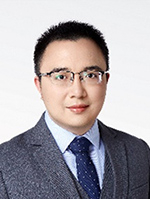用于感知和操纵大规模物理量子比特阵列的低温硅集成电路
日期:2023/06/09 - 2023/06/09
学术讲座:用于感知和操纵大规模物理量子比特阵列的低温硅集成电路
主讲人:Cheng Wang, Professor, University of Electronic Science and Technology of China
时间:2023年6月9日(周五)上午10:00-11:30
地点: 龙宾楼中集报告厅
讲座摘要
Quantum computer is still in the era of noisy intermediate scale quantum (NISQ). 103~106 physical Qubits array are in demand by quantum error correction (QEC) for sufficiently low error rate. The classic-quantum interface, besides the Qubits, has become the bottle neck of scaling. Cryogenic CMOS and SiGe BiCMOS ICs, operating under 1~4 Kelvin, are emerging technology that solves the sophisticated cabling, thermal leakage and feedback delay of conventional room temperature Qubit sensing and manipulation electronics. This talk will share the recent progress of Cryo-CMOS in UESTC, including high performance voltage controlled oscillator (VCO) with cryogenic noise suppression, SiGe low noise amplifier, parametric dividing and dual-Qubit reflectometry array.
主讲人简介
 Cheng Wang received the B.E. degree in Engineering Physics from Tsinghua University, Beijing, China, in 2008, the M.S. degree in Radio Physics from the China Academy of Engineering Physics (CAEP), Mianyang, China, in 2011, and the Ph.D. degree in Electrical Engineering and Computer Science (EECS) from the Massachusetts Institute of Technology (MIT), Cambridge, MA, USA, in 2020. He was an assistant research fellow with the Institute of Electronic Engineering, CAEP, from 2011 to 2015. He served as a research scientist in Analog Devices, Inc. (ADI), Boston, MA, USA in 2020. He is currently a professor in University of Electronic Science and Technology of China (UESTC), Chengdu, China.
Cheng Wang received the B.E. degree in Engineering Physics from Tsinghua University, Beijing, China, in 2008, the M.S. degree in Radio Physics from the China Academy of Engineering Physics (CAEP), Mianyang, China, in 2011, and the Ph.D. degree in Electrical Engineering and Computer Science (EECS) from the Massachusetts Institute of Technology (MIT), Cambridge, MA, USA, in 2020. He was an assistant research fellow with the Institute of Electronic Engineering, CAEP, from 2011 to 2015. He served as a research scientist in Analog Devices, Inc. (ADI), Boston, MA, USA in 2020. He is currently a professor in University of Electronic Science and Technology of China (UESTC), Chengdu, China.
His research interests include CMOS mixed-signal integrated circuits, molecular clock, rotational spectroscopy, cryogenic circuits for quantum computing. Dr. Wang received the Analog Device, Inc. outstanding student designer award in 2016, the IEEE microwave theory and techniques society Boston chapter scholarship in 2017, the ISSCC 2018 student travel grant, the 2018 Chinese government award for outstanding self-financed student abroad, and the MIT microsystem technology laboratory (MTL) 2019 fall doctoral dissertation seminar award (one of two students per year in MTL). In 2020, he was granted the IEEE Solid-State Circuit Society (SSCS) predoctoral achievement award. In 2022, he was recognized as “35 under 35 of China” by MIT technology review.
